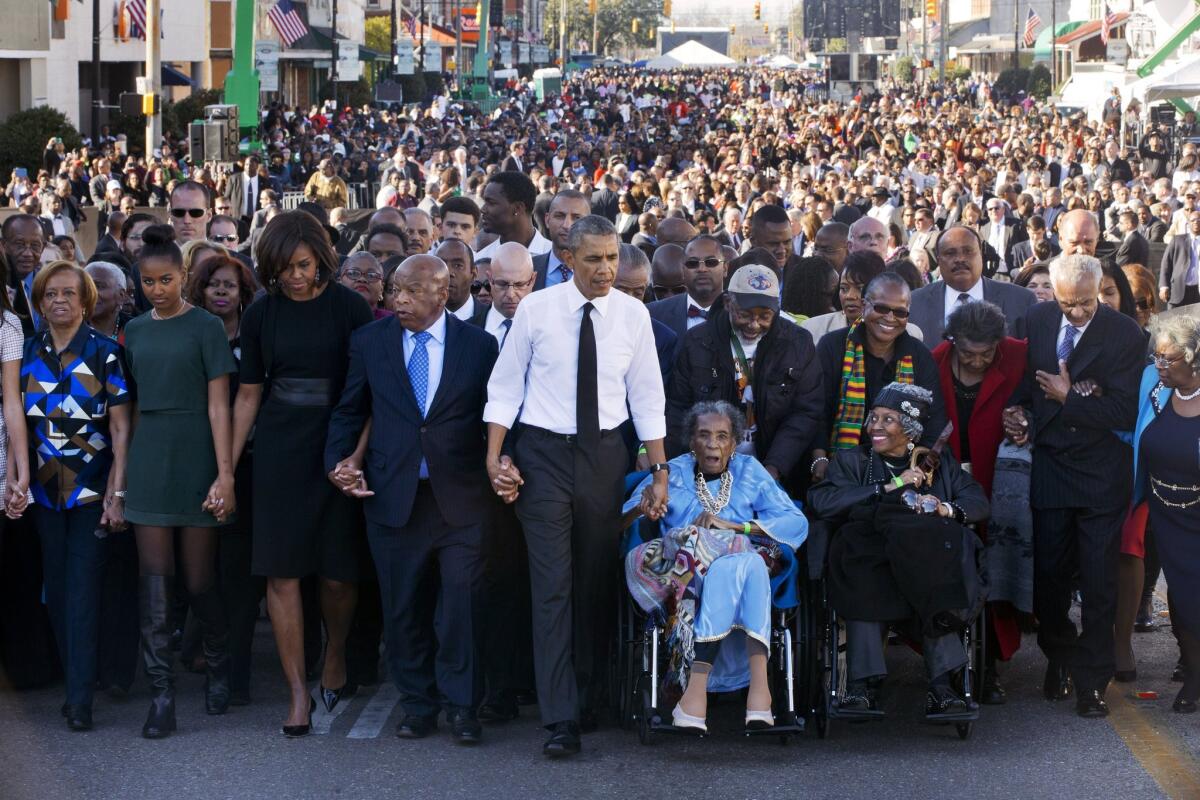Amelia Boynton Robinson dies at 104; civil rights icon was at Selma

President Barack Obama walks as he holds hands with Amelia Boynton Robinson, who was beaten during “Bloody Sunday,” as they, the first family and others walk across the Edmund Pettus Bridge in Selma, Ala.
- Share via
She never became a household name, but the grainy photos of Amelia Boynton Robinson crumpled on the side of the road in Selma, Ala., after being tear-gassed and beaten by state troopers came to be one of the most searing images of America’s civil rights struggle.
Repulsed by the images of what became known as “Bloody Sunday,” Martin Luther King Jr. and other activists quickly flew to Selma and, after one more failed attempt, succeeded in leading a peaceful march from Selma to Montgomery.
Though she was clubbed, gassed and left splayed along the road in the first attempt to cross the Edmund Pettus Bridge, Boynton Robinson’s resolve to fight for change only seemed to deepen.
She was invited later that year to the White House when President Johnson signed the Voting Rights Act. She became the first black woman to run for Congress in Alabama.
And in March — 50 years after the violence in Selma — she crossed the span again, this time in a wheelchair and pushed along by President Obama
Boynton Robinson, known as “Queen Mother” to her devotees, died Wednesday from natural causes at the age of 104, her son, Bruce Boynton, told the Associated Press.
“To honor the legacy of an American hero like Amelia Boynton requires only that we follow her example — that all of us fight to protect everyone’s right to vote,” Obama said in a statement Wednesday.
Boynton Robinson told The Times in a February interview that she held no grudges against those who nearly took her life in 1965.
“I was taught to love people, to excuse their hate and realize that if they get the hate out of them, that they will be able to love,” said Boynton Robinson, whose role in the struggle was captured in the 2015 Oscar-nominated film “Selma.”
“She was a woman of unusual courage and she stood very firm in her beliefs,” said Bernard Lafayette, 75, chairman of the national board of the Southern Christian Leadership Conference, who as a young man fought alongside Boynton Robinson to bring black suffrage to Selma.
Boynton Robinson was instrumental in persuading Martin Luther King Jr. to make the small southern town, with its particularly appalling record of discrimination against blacks, a focal point of the civil rights cause.
She was born in Savannah, Ga., on Aug. 18, 1911, and helped her mother distribute leaflets for the women’s suffrage movement, according to details published on her website.
At 14, she attended Georgia State Industrial College for Colored Youth, now Savannah State University. Two years later she studied under African American botanist and inventor George Washington Carver at Tuskegee University.
Her career took a winding path — she taught, prepared taxes, worked in insurance and real estate, and helped rural women with food preservation and home economics while working with the U.S. Department of Agriculture.
Boynton Robinson, who outlived three husbands, said her parents were instrumental in influencing her efforts to promote equality because they treated everyone as equal, and with respect.
They “never looked down at anybody,” she said.
Boynton Robinson became a registered voter in 1932, a time when many blacks, particularly in the segregated South, were barred from voting by state and local authorities who imposed obstacles such as poll taxes and literacy tests.
She became the first black woman in Alabama to seek a seat in Congress, and though her bid was unsuccessful, she won about 11% of the vote — a noteworthy effort considering few blacks were then registered to vote.
Her trailblazing inspired future generations.
“Her sacrifices paved the way for me to walk the halls of Congress, and I will carry my love and admiration for her in my heart each and every day,” said Terri Sewell, who became Alabama’s first elected black congresswoman in 2010.
In 1965, Boynton Robinson and her husband Samuel Boynton, with whom she raised two children, had held planning sessions for the Edmund Pettus Bridge march at their home in Selma.
The bridge stretches from Selma to Montgomery, the state capital, and because of its design, the marchers reportedly were unable to see the troopers — some on horseback — waiting for them.
Boynton Robinson recalled that a trooper struck her on the shoulder and then again at the base of her neck, knocking her unconscious. Fellow activists came to her aid and she was hospitalized. She said the tear gas damaged her esophagus.
The beating hurt Boynton Robinson physically but failed to crush her resolve. She became more determined than ever “to do better and go farther and ... to help the people to become registered and voters,” she said.
In later years, Boynton Robinson continued championing human rights and equality for all through her work with the Schiller Institute, which was founded by controversial fringe politician Lyndon LaRouche and his wife Helga Zepp-LaRouche.
The veteran activist would eventually grow disappointed over what she viewed as apathy among the black electorate, which she said had “gone back to sleep.” She urged younger African Americans to heed the sacrifices of those who fought for civil rights.
But more than four decades after Bloody Sunday, she would still be alive to witness the ultimate reward of her labor — the election of Barack Obama, America’s first black president.
In January 2015, Boynton Robinson donned a gold suit and glitter shoes and attended Obama’s State of the Union address as a guest of Sewell.
ann.simmons@latimes.com
More to Read
Start your day right
Sign up for Essential California for the L.A. Times biggest news, features and recommendations in your inbox six days a week.
You may occasionally receive promotional content from the Los Angeles Times.







